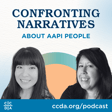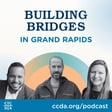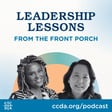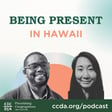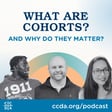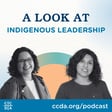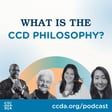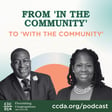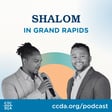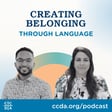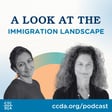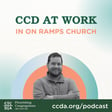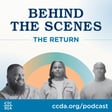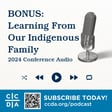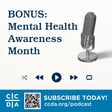Become a Creator today!Start creating today - Share your story with the world!
Start for free
00:00:00
00:00:01

Being A White Ally In White Spaces
Transcript
Introduction: Allyship in White Spaces
00:00:02
Speaker
I'll give an example.
00:00:03
Speaker
Like maybe someone writes a blog, right?
00:00:06
Speaker
They went to a march, right?
00:00:08
Speaker
Black Lives Matter March.
00:00:10
Speaker
White person talking about their experience at a black march.
00:00:15
Speaker
The story is now about them when the real, the real thing that needs to be communicated is happening outside of them.
00:00:25
Speaker
And welcome to the CCDA podcast.
00:00:27
Speaker
Today, Elizabeth Cronlid walks us through being a white ally in white spaces.
00:00:32
Speaker
This workshop audio is from the 2021 CCDA conference.
00:00:36
Speaker
We join them now in their conversation.
Workshop Goals and Challenges
00:00:39
Speaker
Hi, welcome.
00:00:40
Speaker
You are at White Alleyes and White Spaces, being an ally when BIPOCs aren't around.
00:00:44
Speaker
If you did not mean to be in this workshop, too bad you're stuck.
00:00:47
Speaker
Just kidding.
00:00:47
Speaker
You can go out the door, find someone in a red shirt, and they will help you find where you would like to go.
00:00:53
Speaker
But you could also consider that, you know, maybe God ordained your steps and you're here for a reason, right?
00:00:58
Speaker
I'm Elizabeth Cronlund.
00:01:00
Speaker
I'm from Orlando, Florida.
00:01:01
Speaker
I work in congregational ministry at Summit Church, which is an interdenominational church.
00:01:06
Speaker
It is predominantly white, working on becoming more multi-ethnic.
00:01:09
Speaker
And so part of the reason why I created this workshop is out of just really wonderful people within my church and my community just really wanting to be a better ally, but not knowing how.
00:01:21
Speaker
And also they were surrendering to the reality that, you know, I don't really have a lot of BIPOC folks in my life.
00:01:28
Speaker
I don't want to be that weird person like trying to befriend random people on the streets because that just makes you a creeper.
00:01:34
Speaker
But they really sincerely wanted to be helpful in dismantling racism.
Understanding and Defining White Spaces
00:01:40
Speaker
But they didn't really know how to do that when they were not in spaces where BIPOC folks usually are that they don't have them in their lives.
00:01:47
Speaker
And so I created this to hopefully help.
00:01:51
Speaker
Right.
00:01:52
Speaker
And so our objectives for today for you guys is
00:01:55
Speaker
We're going to identify and assess white spaces.
00:01:59
Speaker
We're going to define them so you know what they are.
00:02:01
Speaker
Hopefully gain tools to navigate conflict and then disrupt racism in those spaces.
00:02:06
Speaker
And I mean, I get it.
00:02:07
Speaker
Being a white ally is not easy.
00:02:09
Speaker
Okay.
00:02:10
Speaker
It can be difficult to know when, where, when and where basically you as a white ally can be helpful in disrupting racism.
00:02:20
Speaker
And I mean, white spaces, folks.
00:02:23
Speaker
Okay.
00:02:23
Speaker
One of the most important reasons why I say white spaces is an important place for you guys to disrupt racism or for my BIPOC folks here on behalf of their white friends that they want to talk to later.
00:02:34
Speaker
The reason why white spaces for white allies is a really great space to be is because BIPOC folks aren't there, right?
00:02:42
Speaker
There is no one to speak for BIPOCs.
00:02:43
Speaker
And not necessarily that you should co-opt their stories or their voices, but you can identify, call out, and lovingly, potentially, help people understand when racism is happening in spaces where BIPOC folks aren't.
00:02:56
Speaker
Okay?
00:02:58
Speaker
And so that's really important because ideas and decisions and world views are created in these spaces, right?
00:03:05
Speaker
And so if you are able to add your voice into a place where you influence, you could really change the trajectory of people that you're connected to, who love you, who care about you, and who are influenced by your perspective.
00:03:19
Speaker
Right.
00:03:19
Speaker
So that is why it's so important.
00:03:21
Speaker
And I'm so glad and kind of overwhelmed that there are so many people in this room.
00:03:27
Speaker
All right, so identifying white spaces, identifying racism, and then navigating potential conflict.
00:03:34
Speaker
That's what we're going to go through, right?
00:03:35
Speaker
Okay, so what is a white space?
00:03:38
Speaker
What do you guys think it is?
00:03:39
Speaker
I know some of you may have looked at the worksheet, and I won't.
00:03:42
Speaker
That's okay.
00:03:44
Speaker
What do you consider a white space?
00:03:48
Speaker
I do have treats, if that entices you.
00:03:58
Speaker
A space where all the leaders are white.
00:04:00
Speaker
Or most.
00:04:02
Speaker
Anybody else?
00:04:06
Speaker
Or there?
00:04:11
Speaker
Yeah, a space where there
Influences and Preparation for Anti-Racism
00:04:12
Speaker
aren't BIPOCs, right?
00:04:13
Speaker
Yeah.
00:04:14
Speaker
So, a space that is all white.
00:04:19
Speaker
I mean, this could be your home.
00:04:22
Speaker
It could be your church.
00:04:23
Speaker
Basically, a white space is a place where white majority culture defines the behaviors, the protocols, and the power.
00:04:32
Speaker
Whose way of living, thinking, making decisions kind of imbues that space, right?
00:04:39
Speaker
And so there can definitely be box in the room.
00:04:42
Speaker
But if the rules are set to kind of white majority culture,
00:04:46
Speaker
it's a white space, right?
00:04:47
Speaker
And so many BIPOCs have to navigate these spaces.
00:04:51
Speaker
And as white allies, which I'm hoping you all are or aspire to be, paying attention to these realities can be very, very helpful, right?
00:04:59
Speaker
Because a lot of times what's really hard about being a white ally is you're not always prepared for racism when it appears in white spaces, right?
00:05:07
Speaker
You're not sure how to engage.
00:05:09
Speaker
I mean, we prepare for like natural disasters, right?
00:05:12
Speaker
We do fire drills.
00:05:13
Speaker
We, I mean, I'm from Florida, so we
00:05:16
Speaker
have all sorts of hurricane supplies, right?
00:05:19
Speaker
We get ready for potential conflicts or potential issues, right?
00:05:23
Speaker
We prepare in all sorts of other ways.
00:05:25
Speaker
And I promise you that your BIPOC friends, like we have kind of thought through all the scenarios of the spaces where we might not feel safe or welcome.
00:05:33
Speaker
And so for y'all, this is to help you prepare and think very critically about your spaces and places of influence so that you do feel prepared.
00:05:41
Speaker
I'm not saying be prepared so you can, you know, completely like
00:05:45
Speaker
destroy your friends when they want to like debate things, but so that you don't get caught off guard and feel steamrolled, right?
00:05:53
Speaker
Because one of the things about that is it shuts down relationship and we don't want to do that, right?
00:05:59
Speaker
So white spaces, how about white spaces that influence you?
00:06:05
Speaker
What does your bookshelf look like?
00:06:09
Speaker
Who are you listening to in your podcasts?
00:06:12
Speaker
Is this conference the only place where you're getting to hear from theologians, pastors, and preachers, and speakers of color?
00:06:19
Speaker
I'm not saying, you know, throw out N.T.
00:06:21
Speaker
Wright.
00:06:21
Speaker
Like, no.
00:06:22
Speaker
Keep him.
00:06:23
Speaker
We like him.
00:06:24
Speaker
But maybe, just maybe, hit the IVP bookstore and start, you know, building that shelf for yourself.
00:06:31
Speaker
Start being influenced by the voices and perspectives of people of color.
Reflecting on Racist Ideas and Power Dynamics
00:06:36
Speaker
And I mean, CCDA is a really good vetting source, right?
00:06:39
Speaker
So if IVP and CCDA are telling you like, hey, these people have solid theology and really good perspectives, this may be a good place for you to start to build that influence for yourself where you can be influenced by and flexible in those areas, right?
00:06:53
Speaker
And so we are going to do a little bit of white space mapping on your worksheet, right?
00:07:01
Speaker
There is that identify space.
00:07:03
Speaker
Okay.
00:07:04
Speaker
And if you have a pen, definitely write it down.
00:07:06
Speaker
Or you can just kind of think through this.
00:07:08
Speaker
Right.
00:07:09
Speaker
So what are the all white spaces in my life?
00:07:11
Speaker
Okay.
00:07:12
Speaker
It doesn't have to be like not every white space has only white people like we brought up.
00:07:19
Speaker
Not every white space is a white space at all times.
00:07:22
Speaker
Right.
00:07:22
Speaker
Right.
00:07:23
Speaker
Just think about that.
00:07:24
Speaker
Sometimes when certain people enter and leave a room, the power dynamics change and that room becomes a very different space, right?
00:07:32
Speaker
Like anywhere where two or more believers come together, like that's the church.
00:07:36
Speaker
That space is transformed just by the people inside of it.
00:07:39
Speaker
And that's the same here.
00:07:40
Speaker
When power dynamics change within a space, a space can change from a white space to a different kind of space.
00:07:48
Speaker
And also, not every white space is inherently bad.
00:07:51
Speaker
Please don't hear that.
00:07:53
Speaker
And not every white space is a physical space or venue.
00:07:57
Speaker
I mean, your bookshelf is a physical space, but I'm talking more about your mind, your heart, the things that you're listening to.
00:08:04
Speaker
Like, what are the things that influence you?
00:08:05
Speaker
So let's take a couple minutes and just kind of think through where are your white spaces where you do life?
00:08:12
Speaker
I'll give you guys a couple minutes here.
00:08:15
Speaker
So as you guys are thinking, this whole process on this worksheet is basically us working through these questions up here.
00:08:22
Speaker
What are the all-white spaces in my life or just white spaces?
00:08:25
Speaker
It doesn't have to be all-white folks to be a white space.
00:08:27
Speaker
Who are the people in these spaces and how am I connected to them?
00:08:31
Speaker
We want to look through a lot of this in a relational, influential lens.
00:08:37
Speaker
Have people in these spaces expressed racist ideas and beliefs?
00:08:41
Speaker
And what were
Anti-Racist Actions and Concepts
00:08:42
Speaker
they?
00:08:42
Speaker
Not just the beliefs, but maybe the behaviors as well, right?
00:08:46
Speaker
And then what can I do?
00:08:47
Speaker
That's the real question, right?
00:08:48
Speaker
What can I do?
00:08:50
Speaker
All right, you'll have more time with this worksheet because I'm not going to take them back.
00:08:52
Speaker
Don't worry.
00:08:53
Speaker
You can bring them home with you.
00:08:55
Speaker
So what we're going to do now is we're going to define what's racist.
00:08:57
Speaker
And you're like, hey, I'm at CCDA.
00:09:01
Speaker
Keep going.
00:09:02
Speaker
But just follow me here, right?
00:09:04
Speaker
So...
00:09:05
Speaker
We usually think about when we use the term racist, some folks in white spaces get really, really touchy about it because they hear not, hey, you said something that was racist.
00:09:16
Speaker
They hear you are racist.
00:09:18
Speaker
Right.
00:09:19
Speaker
And when they hear the term racist, we know that racist means bad.
00:09:23
Speaker
So you're telling them you are bad.
00:09:25
Speaker
Mm hmm.
00:09:26
Speaker
Right.
00:09:26
Speaker
And that's that's not what we want to communicate.
00:09:29
Speaker
I mean, maybe we do, but that's probably not the best posture for a Christian.
00:09:33
Speaker
We want to communicate that the thing that happened, the behavior that we observe, the things that was said was racist.
00:09:41
Speaker
And so instead of just getting stuck on racist.
00:09:45
Speaker
I think that Ibram Kendi uses these two terms, racist and anti-racist.
00:09:52
Speaker
And so racist is supporting a racist policy through actions or inaction or expressing a racist idea.
00:09:58
Speaker
And then anti-racist is supporting an anti-racist policy through actions or expressing an anti-racist idea.
00:10:05
Speaker
And so the opposite of racist is not not racist.
00:10:09
Speaker
Although you hear that a lot, right?
00:10:11
Speaker
I'm not racist.
00:10:12
Speaker
And then you're just like, red flag, maybe you are.
00:10:14
Speaker
But.
00:10:17
Speaker
The opposite, because racism and race, like racism is active, right?
00:10:22
Speaker
And so it's how you behave, how you are thinking, what you are doing, what you are saying, and your thoughts, your behaviors, they can change, right?
00:10:32
Speaker
If we believe that you are stuck being racist forever, then why do we even bother, right?
00:10:37
Speaker
But we believe in transformation.
00:10:38
Speaker
We are people of transformation, and so I have got to believe that people can be transformed, right?
00:10:44
Speaker
And so...
00:10:45
Speaker
kind of looking at things through this lens, we are looking at behaviors, actions, instead of saying you are racist, you are saying, hey, when you made that joke about chinks, that was racist.
00:10:58
Speaker
That joke is racist.
00:11:00
Speaker
They may recoil.
00:11:02
Speaker
They usually do.
00:11:04
Speaker
But you are not saying that you are a bad person.
00:11:06
Speaker
You're saying that behavior was not cool.
00:11:10
Speaker
It made me uncomfortable.
00:11:12
Speaker
and you're connected to me, right?
00:11:13
Speaker
And then anti-racist, the reason why it's important that just not racist is not enough is because neutral is basically complicit, right?
00:11:23
Speaker
And I'm guessing that if some of you are here because you felt shut down in some of these spaces and not sure what to do, and you felt like through that fear or through that kind of deer in headlights moment where you were doing really quick relational math,
00:11:39
Speaker
You didn't act and you may have felt like, oh, my gosh, am I complicit, right?
00:11:44
Speaker
I don't want you to feel that way, right?
Policy Impact and Awareness
00:11:46
Speaker
And so anti-racist would be specifically supporting, taking action that is clearly and distinctly anti-racist, wanting to take a posture of supporting of the things that dismantle racism because it's not a static thing, right?
00:12:03
Speaker
All right.
00:12:05
Speaker
Okay, here's another thing.
00:12:07
Speaker
So policies, any sort of rules, right?
00:12:09
Speaker
They're often given by authorities, but not always.
00:12:13
Speaker
Those that may govern a space or an organization, right?
00:12:16
Speaker
And sometimes it's really easy to tell where something falls, but not always, right?
00:12:20
Speaker
Whether it's racist or it's not, like what's the intent?
00:12:22
Speaker
What's the impact, right?
00:12:24
Speaker
Can you guys think of something that maybe recently or in recent history, you know, that was well-intentioned as a policy, but actually turned out to be racist?
00:12:34
Speaker
Anybody?
00:12:34
Speaker
Can you think of anything?
00:12:36
Speaker
The war on drugs.
00:12:37
Speaker
Yes, yes, indeed.
00:12:39
Speaker
If you're not sure if something is racist when it comes to being a policy or even like organizational policy,
00:12:48
Speaker
The intent is not enough, right?
00:12:50
Speaker
Good intentions are not enough when we're people of God and we want to do better, right?
00:12:53
Speaker
We have to look at the actual impact.
00:12:55
Speaker
So we can use all the right words and say all the right things, but if the impact does not match the intent, we've missed something, right?
00:13:04
Speaker
Someone whose voice needed to be in the room was not, or someone wasn't there, to point out that someone wasn't there.
00:13:11
Speaker
Someone who will hopefully be you one day.
00:13:15
Speaker
Let's see.
00:13:16
Speaker
How about this?
00:13:17
Speaker
What's a racist idea or belief that was part of your upbringing?
00:13:22
Speaker
Just take a moment.
00:13:23
Speaker
And if you're willing to share, I'd love to hear from y'all.
00:13:29
Speaker
Yes.
00:13:30
Speaker
That black boys are dangerous and I shouldn't date them.
00:13:33
Speaker
Yeah.
00:13:35
Speaker
Anybody else?
00:13:36
Speaker
It's not safe to go downtown.
00:13:38
Speaker
Okay.
00:13:39
Speaker
I saw a hand here and a hand here.
00:13:41
Speaker
Yeah, but you are where you are because you still work hard enough, you know.
00:13:45
Speaker
Yeah, so you are where you are because, yeah, you didn't work hard enough, kind of pull yourself up by your bootstraps, right?
00:13:51
Speaker
Poverty is a result of laziness.
00:13:53
Speaker
Oh, that poverty is a result of laziness.
00:13:56
Speaker
So kind of people who maybe are not familiar or native English speakers, something would come out not quite the way they might want or maybe heard a different way.
00:14:07
Speaker
Yeah, that can be racist, especially if people make fun of it, right?
00:14:10
Speaker
Okay, and one last one.
00:14:11
Speaker
Oops.
00:14:13
Speaker
Right, right.
00:14:14
Speaker
And so that's very common in immigrant communities coming in, that first generation of children after the immigrant parents.
00:14:23
Speaker
There's a lot of tension where we came here with nothing.
00:14:27
Speaker
Why can't others do the same kind of that bootstrap idea?
00:14:29
Speaker
Pull yourself up by your bootstraps.
00:14:31
Speaker
Right.
00:14:31
Speaker
And I bring this up because the reality is that all of us have been shaped and formed by racist ideas, whether they were explicit, like don't date black boys or kind of implicit.
00:14:43
Speaker
Right.
00:14:44
Speaker
Don't go downtown.
00:14:45
Speaker
Right.
00:14:46
Speaker
And that matters, right?
00:14:48
Speaker
And I want you guys to connect to that reality because when we are engaging with folks who may be displaying racist behaviors or thoughts and ideas, we are all there.
00:14:59
Speaker
We're all influenced by these things.
00:15:00
Speaker
And so as difficult as it can be at times, especially when the racism meter is way high,
00:15:08
Speaker
we have to remember that we're not perfect in this either,
Continuous Learning in Anti-Racism
00:15:10
Speaker
right?
00:15:10
Speaker
And that's the wonderful thing about being racist versus anti-racist.
00:15:14
Speaker
Being anti-racist means that your job is never done.
00:15:16
Speaker
You've never arrived, right?
00:15:18
Speaker
You have to keep working at it.
00:15:21
Speaker
And I'm Asian American, right?
00:15:23
Speaker
I'm an AAPI woman, and there is a ton of anti-blackness within the Asian American community.
00:15:28
Speaker
And we're not a monolith, but still, there's this belief that, you know,
00:15:33
Speaker
If you're on the lighter end of the spectrum, a lot of colorism, then you have better options.
00:15:39
Speaker
You're a higher class and this belief that those who are darker, they're poor, they're not as good.
00:15:45
Speaker
And there are some very, very explicit things that your lolas, your grandmas would say to you like, oh, you can date a white person, but never date a black person.
00:15:55
Speaker
And there's even racism within the community as well.
00:15:59
Speaker
So how do we identify it?
00:16:00
Speaker
Right?
00:16:01
Speaker
Identifying racism in white spaces.
00:16:06
Speaker
This is where our handy dandy pyramids will come in for you guys.
00:16:12
Speaker
We think that racism is going to be easy to identify, but honestly, nowadays, it's not as easy as you might think, unless you're in it all the time, constantly aware of it and kind of looking to see where you can disrupt things, right?
00:16:27
Speaker
If you're not steeped in wondering about equity and things like that, you could really miss some things.
00:16:32
Speaker
That intent and impact gap may exist in your spaces and you might not realize it because you haven't been paying attention because you haven't had someone draw your attention to it yet.
00:16:42
Speaker
Right?
00:16:43
Speaker
And so...
00:16:45
Speaker
This is kind of the pyramid of white supremacy.
00:16:47
Speaker
Like it always escalates.
00:16:48
Speaker
Like we think about genocide and, you know, murder and calls for violence from the KKK and things like that.
00:16:54
Speaker
Right.
00:16:55
Speaker
These are this is kind of the scale where everything from normalization, the kind of pull yourself up by your bootstrap stuff, the don't go downtown.
00:17:04
Speaker
Oh, that's a really shady neighborhood.
00:17:06
Speaker
I want to live in a nice neighborhood with my kids going to a nice school.
00:17:10
Speaker
You know, these are all things that we've normalized.
00:17:13
Speaker
But there's also indifference.
00:17:14
Speaker
Right.
00:17:16
Speaker
Things like, I don't see color.
00:17:18
Speaker
Well, then you don't see me, right?
00:17:21
Speaker
So I don't see color.
00:17:22
Speaker
Things like that where it's not that big a deal, right?
00:17:25
Speaker
Like, does this really affect my everyday?
00:17:28
Speaker
As a white person, it might not.
00:17:30
Speaker
But it definitely affects your soul.
00:17:33
Speaker
So here's the thing.
00:17:35
Speaker
Aversive racism.
00:17:37
Speaker
That's what you're probably going to meet a lot of.
00:17:39
Speaker
So aversive racism is one of the things that you will very likely encounter in white spaces.
00:17:44
Speaker
Right.
00:17:45
Speaker
So Robin DiAngelo and white fragility.
00:17:47
Speaker
And I know she's problematic for my friends in the room.
00:17:52
Speaker
says that it is a manifestation of racism that well-intentioned people who see themselves as educated and progressive are more likely to exhibit.
Racism: Overt, Covert, and Aversive
00:18:01
Speaker
It exists under the surface of consciousness because it conflicts with consciously held beliefs of racial equity and justice.
00:18:09
Speaker
Right?
00:18:10
Speaker
Like, I'm not racist.
00:18:12
Speaker
I voted for Obama.
00:18:13
Speaker
Like...
00:18:15
Speaker
All that kind of stuff, right?
00:18:18
Speaker
And this is really frustrating for BIPOC folks, right?
00:18:21
Speaker
Because we know that folks who tend to have more progressive ideas about equity and justice, like they're for us.
00:18:29
Speaker
They want our voices.
00:18:31
Speaker
But if you look at the numbers, they are the least likely to live in integrated neighborhoods.
00:18:35
Speaker
They are the most segregated.
00:18:36
Speaker
They are the most likely to take their children and move them into a better school district and things like that.
00:18:42
Speaker
So this is that disconnection of ideas and lived reality, right?
00:18:46
Speaker
Orthodoxy versus orthopraxy.
00:18:48
Speaker
We have great ideas.
00:18:50
Speaker
We have good ideas.
00:18:51
Speaker
Godly, wonderful, pure ideas.
00:18:53
Speaker
But...
00:18:55
Speaker
We're not going to live it.
00:18:56
Speaker
And so this aversive racism allows this kind of cognitive dissonance to exist, right?
00:19:05
Speaker
And so the other scary triangle that you have.
00:19:08
Speaker
So there's overt racism, white supremacy.
00:19:11
Speaker
Like this is the stuff that anybody can call out and we get it, right?
00:19:14
Speaker
January 6th.
00:19:16
Speaker
right?
00:19:16
Speaker
Like, I mean, maybe not, but, um, neo-Nazis, KKK, all of these things, but underneath the obvious stuff, right?
00:19:28
Speaker
We've got covert, uh, white supremacy.
00:19:30
Speaker
So this is kind of the aversive racism, the stuff that you don't really, you can't always pinpoint.
00:19:37
Speaker
I think it's getting easier now because there's so much more on social media.
00:19:40
Speaker
You're seeing things in the news, you're seeing things from your friends, like all sorts of stuff.
00:19:44
Speaker
Um,
00:19:45
Speaker
But the further down you go, the harder it is to pinpoint whether or not it's racist sometimes, right?
00:19:52
Speaker
Because we're seeing more things where I think it's on their Confederate flags.
00:19:56
Speaker
Like that's slowly making its way up into overt supremacy, right?
00:20:00
Speaker
Where BIPOC folks were like, we told you.
00:20:03
Speaker
But some people don't see it there yet.
00:20:07
Speaker
And part of this also is that policies have changed.
00:20:11
Speaker
Like, Sing Chan Ra talked about, you know, things may change, like racism, slavery, all of those things.
00:20:17
Speaker
Like, the narrative never changed.
00:20:20
Speaker
So, yeah, the Civil Rights Acts came through and all of a sudden being openly racist was no longer okay, right?
00:20:27
Speaker
But...
00:20:29
Speaker
You can say things like, don't blame me.
00:20:31
Speaker
I never owned slaves.
00:20:32
Speaker
You can say things like, you know, it's just a joke.
00:20:37
Speaker
When you dismiss the potential harm and hurt that may be happening to a BIPOC person through it, like those are all different kind of socially acceptable.
00:20:45
Speaker
Like those are excuses that people will accept sometimes.
00:20:48
Speaker
They shouldn't, but they do.
00:20:49
Speaker
Right.
00:20:50
Speaker
And so.
00:20:52
Speaker
These are topics, you know, if you're looking through these and some of these you're not familiar with, you got it on your sheet.
00:20:58
Speaker
I challenge you, if there's something on that sheet, like circle it, make a note of it.
00:21:03
Speaker
Like that's your spiritual battlefield right now.
00:21:06
Speaker
Figuring out what that thing is, getting more information about it, making yourself more aware and informed without burdening your BIPOC friends to teach you.
00:21:18
Speaker
Hi, I'm Lorenzo.
00:21:19
Speaker
What I love about CCDA is being connected to so many amazing leaders across the country.
00:21:25
Speaker
Welcome to the CCDA podcast.
00:21:29
Speaker
Is anyone willing to share something that they're like, oh, apparently that's racist?
00:21:37
Speaker
It's okay.
00:21:37
Speaker
We're not going to judge you.
00:21:38
Speaker
It's only recording.
00:21:39
Speaker
There's no video in the room.
00:21:40
Speaker
Yes.
00:21:41
Speaker
Expecting TLC to teach BIPOC.
00:21:43
Speaker
Yeah, expecting BIPOC folks to teach you.
00:21:45
Speaker
Yeah.
00:21:46
Speaker
So I can break this down just a little bit because I think that's a super common one, right?
00:21:51
Speaker
And so...
00:21:53
Speaker
Right now, like I said, there's so much information out there, right?
00:21:56
Speaker
You are just one very carefully worded Google search away from a wealth of information that's helpful.
Self-Education and Sensitivity
00:22:01
Speaker
And potentially, you know, a less carefully worded Google search away from your doom.
00:22:07
Speaker
But...
00:22:11
Speaker
But the reason why, you know, you don't want to go directly to your BIPOC friends is there aren't a ton of us around in mostly white spaces, and you can, you better believe that every white person is asking us.
00:22:24
Speaker
And so for you, this is the first time that you're asking, and, like, we get that.
00:22:28
Speaker
I get it every time, like, another person comes up and is like, hey, I just want to get coffee with you.
00:22:31
Speaker
And I'm like, I am set for coffee for the rest of my life.
00:22:35
Speaker
Yeah.
00:22:36
Speaker
I love you.
00:22:37
Speaker
I'm going to point you over to Latasha Morrison's organization for a little bit.
00:22:42
Speaker
Give me a break.
00:22:42
Speaker
But the reason why is that idea of emotional labor.
00:22:47
Speaker
You are asking someone that you know and you trust that you understand that they have an experience that is of value to you.
00:22:54
Speaker
And that's not missed sometimes.
00:22:56
Speaker
But when a lot of people are asking that...
00:23:00
Speaker
it becomes laborious.
00:23:01
Speaker
It's tedious.
00:23:02
Speaker
But also, when you're asking people to share from their experience, especially when it involves racism and
00:23:09
Speaker
it's painful, right?
00:23:11
Speaker
And so even if it's a small story here or there, you're asking them to share some of their trauma with you.
00:23:17
Speaker
And so if you have a very close relationship with somebody and you've heard them speak about experiences in their lives, then that might be a place where you can have conversations about that.
00:23:28
Speaker
But if you've never heard one of your BIPOC friends tell you about an experience of racism, I probably wouldn't go ask them and be like, hey, has racist stuff happened to you?
00:23:39
Speaker
Right.
00:23:40
Speaker
Because I just feel like we're not really friends.
00:23:44
Speaker
No, but because a lot of people are going to be asking their friends, especially over the last two years.
00:23:49
Speaker
Right.
00:23:50
Speaker
The number of things being asked of people of color, especially like women of color, you know, to do a lot of the work.
00:23:57
Speaker
And right now there's just so much available.
00:23:59
Speaker
And.
00:23:59
Speaker
Y'all here at CCDA, like that's a big step that you guys are taking, right?
00:24:04
Speaker
You have a wealth of knowledge and resources at your fingertips to start to do the work.
00:24:11
Speaker
And so if you're not sure if a BIPOC person is, you know, willing to talk to you, if you're not sure, the answer is probably no.
00:24:19
Speaker
I'm just going to put that out there.
00:24:20
Speaker
This is for my BIPOC friends.
00:24:22
Speaker
If someone has offered it to you, receive it graciously.
00:24:26
Speaker
If someone is, you know,
00:24:28
Speaker
specifically in the work of DEI or, you know, dismantling racism, pay them for their work.
00:24:36
Speaker
right?
00:24:37
Speaker
Because it is work and it is labor.
00:24:39
Speaker
And it's a type of expertise that matters, right?
00:24:42
Speaker
Like you guys paid to get to this conference because this information matters.
00:24:47
Speaker
That lived experience that's embodied within the CCDA membership and leaders, oh, it's so valuable, right?
00:24:54
Speaker
And so place that value on the BIPOC folks in your life and that you have access to if you are
00:25:00
Speaker
hoping to kind of access that information from them.
00:25:04
Speaker
But also be aware if someone says no, it's not because they don't like you.
00:25:07
Speaker
It's because they're probably really tired.
00:25:09
Speaker
Right.
00:25:11
Speaker
And and so I'm not saying you should never talk to your BIPOC friends about racism or anything like that.
00:25:17
Speaker
But I am saying, please be very careful.
00:25:19
Speaker
Like we're tired and we're hurting.
00:25:22
Speaker
And I'll also add on that, so many people like to send me videos of racist things, and I'm like, stop traumatizing me in my DMs.
00:25:32
Speaker
But believe me, this happens so often, and it's out of a place of like, I'm with you.
00:25:38
Speaker
But it's also like, you're hurting me.
00:25:41
Speaker
Please stop, right?
00:25:43
Speaker
So just be very, very careful if there's something you can do, especially on social media feeds.
00:25:50
Speaker
please don't post the videos to your feeds.
00:25:52
Speaker
If you have BIPOC friends, please don't post it to your feeds.
00:25:55
Speaker
You can post a link to a video, just don't post the video itself.
00:25:58
Speaker
That's just pro tip on how to care for your BIPOC friends because folks get traumatized and re-traumatized through these images, even if it's not directly involving their people group.
00:26:11
Speaker
When stuff is happening with Latinx friends, I feel that.
00:26:15
Speaker
My family is a family of immigrants.
00:26:16
Speaker
And so...
00:26:19
Speaker
Just be careful.
00:26:20
Speaker
Be cautious.
00:26:21
Speaker
When you are intellectually piqued and kind of interested, stop and think.
00:26:26
Speaker
Is there pain on the other end of this equation?
00:26:29
Speaker
Because your kind of cognitive curiosity that's coming out of a good place, you're wanting to better yourself, what is the cost on the other end, right?
00:26:38
Speaker
So I'm going to step off the soapbox.
Confronting Racism in White Spaces
00:26:41
Speaker
We're going to talk about the backstage and the front stage, right?
00:26:46
Speaker
So...
00:26:47
Speaker
This is kind of talking about how white folks kind of operate.
00:26:51
Speaker
So this comes from Dr. Leslie Pica's Two-Faced Racism, Whites in the Backstage and Frontstage.
00:26:58
Speaker
So in the front stage, this is where BIPOC folks may be, right?
00:27:02
Speaker
And racist statements are not okay here.
00:27:05
Speaker
And any race talk should be avoided in those spaces, right?
00:27:09
Speaker
But they may be okay with these conversations in the backstage where only white people will hear them.
00:27:16
Speaker
And so bottom line, this kind of dichotomy means that there is a belief that there's an appropriate place for racism, right?
00:27:25
Speaker
White spaces, specifically, where the rules apparently feel different to others, that there's some sort of kinship in this place that protects them.
00:27:33
Speaker
And we'll talk about how to engage this specifically, but
00:27:38
Speaker
If you are not okay with these things, please make sure other people know it, right?
00:27:43
Speaker
Because if someone is saying racist things without pause in a space where you are, they believe that you are in with them, right?
00:27:52
Speaker
And so for you to say nothing or even just – I'm a really big fan of a strong facial reaction.
00:27:59
Speaker
Right?
00:28:01
Speaker
Right?
00:28:02
Speaker
Anything to show your dissent.
00:28:04
Speaker
Right?
00:28:06
Speaker
Anything to show I'm not okay with that.
00:28:09
Speaker
Your body language.
00:28:10
Speaker
I mean, get up out of the room if you can.
00:28:12
Speaker
Right?
00:28:13
Speaker
Whatever it is that you can do to say no, not okay.
00:28:17
Speaker
Disrupts this idea that there's a place where this is okay.
00:28:20
Speaker
Right?
00:28:20
Speaker
Okay.
00:28:23
Speaker
Roles in the backstage conversation.
00:28:26
Speaker
I'm going to make you guys dig deep here.
00:28:28
Speaker
Right?
00:28:29
Speaker
As I go through these.
00:28:31
Speaker
Have you ever been in one of these positions?
00:28:34
Speaker
So the protagonist, we're treating this like a fictional story, although it's a very real reality.
00:28:39
Speaker
So protagonist, the one who initiates the racist act.
00:28:42
Speaker
This is the terrible joke teller.
00:28:44
Speaker
This is your uncomfortable cousin at Thanksgiving saying all the things that you don't want to hear or that are not okay.
00:28:52
Speaker
The cheerleaders, those who encourage through laughter or agreement.
00:28:57
Speaker
I'm going to tell you, those are sometimes the most painful folks to interact with as a BIPOC person when you are in a white space where BIPOC folks are around.
00:29:05
Speaker
If someone makes a racist joke and everyone seems okay with it, you are no longer in a space that is safe.
00:29:11
Speaker
All stop.
00:29:13
Speaker
Then spectators, those who stand in silence.
00:29:16
Speaker
And like, we have no idea.
00:29:18
Speaker
Are they okay with it?
00:29:19
Speaker
Are they not?
00:29:20
Speaker
I mean, silence is complicit.
00:29:22
Speaker
And so whether you say it with your face or you say it with your voice in some way, don't allow people to believe that you're complicit in racist behaviors and ideas and jokes, right?
00:29:33
Speaker
And then the dissenter, one who objects.
00:29:35
Speaker
And this is rare.
00:29:36
Speaker
It's hard.
00:29:37
Speaker
When you are in a space where you have relationship and kinship and all of those things, it costs you to go against what's expected, right?
00:29:46
Speaker
And that's the fear, right?
00:29:48
Speaker
The fear that if I speak up in this time, I will be rejected.
00:29:52
Speaker
If I speak up here, I will get steamrolled.
00:29:56
Speaker
I don't know what to expect, right?
00:29:58
Speaker
And so that's why this is rare because we're all talking, we're talking in terms of relationship here in these spaces where you do life, you have relationships.
00:30:06
Speaker
And people may be engaging in this behavior, and you don't want to.
00:30:10
Speaker
So how do we deal with this, right?
00:30:13
Speaker
So I want you guys to kind of think about this.
00:30:15
Speaker
Try and pull a scenario into your mind.
00:30:19
Speaker
Have any of you experienced this?
00:30:21
Speaker
Have any of you been in one of these roles?
00:30:23
Speaker
If you've been the protagonist, like if you share, you're really, really brave and let's be very kind.
00:30:30
Speaker
But have you ever been in one of the other roles before?
00:30:34
Speaker
Let me just hold that and think about it.
00:30:37
Speaker
Have you ever heard a backstage conversation?
00:30:41
Speaker
Think back.
00:30:41
Speaker
Has there ever been a time where someone clearly thought it was okay to make some sort of racist joke or they said something that was just not right?
00:30:51
Speaker
Yes.
00:30:53
Speaker
I feel like Enneagram is something that everyone keeps tossing out there.
00:30:57
Speaker
Being Enneagram 2-3, like...
00:31:01
Speaker
I find myself often being the harmonizer in a room and like in a party or something like that.
00:31:08
Speaker
So if there was ever a backstage conversation, to be the dissenter is to kill the room.
00:31:16
Speaker
And so I think in my own self-discovery, I've realized those spaces where I've just kind of, ha, ha, ha, and then walked away, and then actually going against it because it's that people-pleasing side that I think happens in a lot of white spaces.
00:31:33
Speaker
Yeah.
00:31:33
Speaker
With family, with friends, and since becoming...
00:31:41
Speaker
Yeah, clergy, I feel like I've had a more harder conviction of like feeling like, okay, it has to stop.
00:31:50
Speaker
But I think that the people-pleasing thing is a very common.
00:31:53
Speaker
Absolutely.
00:31:54
Speaker
And so people-pleasing, right?
00:31:56
Speaker
You want the space to be harmonious.
00:31:58
Speaker
And in that moment when a racist attitude or behavior is displayed, there's tension.
00:32:03
Speaker
And we don't like that.
00:32:05
Speaker
Sometimes if we aren't used to engaging discomfort, we read discomfort as danger, right?
00:32:11
Speaker
And so if you are not prepared, if you haven't thought about it, if you encounter it, you don't think to encounter it in a space and it happens, it'll hit you like a ton of bricks.
00:32:20
Speaker
And it will feel like danger because you know it's wrong and you feel that working of the Holy Spirit just getting your blood pumping right.
00:32:30
Speaker
But then all that, you know, your personality, your relationships...
00:32:34
Speaker
society, whatever it may be, you don't know what to do, right?
00:32:38
Speaker
And you're conflicted.
00:32:40
Speaker
And so, yes, some people laugh when they're nervous.
00:32:45
Speaker
I'm a nervous laughter.
00:32:46
Speaker
I kind of, it's so obvious that I'm nervous when I laugh, though.
00:32:49
Speaker
I can't, I'm a terrible actress.
00:32:53
Speaker
But the unfortunate thing about that is nervous laughter sometimes reads as just laughter.
00:33:00
Speaker
And that's not what you want to do, right?
00:33:02
Speaker
So if a BIPOC person happens to be within your purview or nearby, happens to overhear a conversation, which has happened to me, right?
00:33:10
Speaker
There was definitely real laughter, but there was also nervous laughter because they didn't know what to do with the statement that was made.
00:33:18
Speaker
And one of them saw me and was just like, oh, no.
00:33:21
Speaker
But yeah, nervous laughter doesn't always read as nervous laughter to the BIPOC person being affected by the violence of the words.
00:33:28
Speaker
And so that may be your default.
00:33:31
Speaker
It's my default too, right?
00:33:33
Speaker
I have to fight really, really hard that when I'm nervous, that I don't accidentally encourage terrible behavior through my laughter because I don't know what to do with it.
00:33:42
Speaker
I'm still working on it.
00:33:44
Speaker
a lot of these conversations are happening and it's not the obvious, right?
00:33:47
Speaker
It's not obvious stuff.
00:33:49
Speaker
Um, it's usually the things that you're not really sure what to do with.
00:33:53
Speaker
Like, you know, it's not right, but the other people in the room may not realize that.
00:33:57
Speaker
And you're dealing with that tension.
00:33:58
Speaker
Right.
00:33:59
Speaker
Um, so we're gonna, we're gonna get to that in just a little bit.
00:34:03
Speaker
And I saw one more hand.
00:34:04
Speaker
Yes.
00:34:07
Speaker
Yeah, so they're definitely, you know, over time, like, thoughts and ideas have changed about social interaction.
00:34:13
Speaker
So there is a time when as long as you're not participating, like, that's okay.
00:34:17
Speaker
You've done the right thing.
00:34:18
Speaker
But I think we've hit a spot in human history in the arc of justice and the arc of, like, humanity where just standing by is not okay anymore.
00:34:27
Speaker
It's not enough, right?
00:34:28
Speaker
Because... And it's going to be a growth thing, right?
00:34:31
Speaker
Yeah, and it is a growth thing.
00:34:34
Speaker
I've been here first, and then I've been there.
00:34:36
Speaker
I've been...
00:34:37
Speaker
the one that sat quiet.
00:34:39
Speaker
And then I had to grow out of that because of just the guilt that I felt.
Embracing Imperfection and Persistence
00:34:43
Speaker
It was finally standing up and, again, made a big mistake, called this person out in a big group.
00:34:49
Speaker
That didn't go well.
00:34:50
Speaker
And then later on, called another person out
00:34:54
Speaker
Outside of the group, which seems to work the best.
00:34:57
Speaker
Yeah, and so, yeah.
00:35:00
Speaker
Yeah, so sometimes your role can change over time as you grow and as you experience, as you experiment.
00:35:05
Speaker
And all the stuff we're going to talk about today, like, you're not going to get it perfect.
00:35:09
Speaker
Like, if you think coming to this workshop or going to CCDA is going to set you up to perfectly interact with every other human in the world, like, I am so sorry, my friends.
00:35:19
Speaker
LAUGHTER
00:35:21
Speaker
I mean, we had some really great psychologists and like therapists on stage earlier.
00:35:25
Speaker
I mean, they might be able to help you out, but you're going to mess up.
00:35:29
Speaker
That's the other bit of it.
00:35:31
Speaker
the fear of messing up, right?
00:35:33
Speaker
You gotta, you gotta give that up.
00:35:35
Speaker
You really do.
00:35:36
Speaker
Because God didn't make you to perform perfectly.
00:35:38
Speaker
He just, he made you perfectly, right?
00:35:41
Speaker
But sin has created a situation in the world that we live in where our actions and our thoughts, we're not in perfect communication with one another and God now, right?
00:35:49
Speaker
And so we have to be more careful about what we do and how we do it.
00:35:53
Speaker
Um,
00:35:54
Speaker
But yeah, we're going to mess up.
00:35:57
Speaker
And sometimes messing up is the best teacher ever.
00:36:00
Speaker
You never forget like when you've messed up, right?
00:36:03
Speaker
So I want you guys to kind of look back at your worksheet and assess.
00:36:07
Speaker
I want you guys to choose a space that you may have listed or maybe one that you're thinking about now.
00:36:13
Speaker
I want you to list it.
00:36:14
Speaker
And then think about the observed behaviors or attitudes that you are associating with that space, something that you've definitely seen, something that you think you may have seen or experienced.
00:36:26
Speaker
Like, go ahead and take a moment to kind of think about that right now.
00:36:31
Speaker
And then as you're finishing that part up, go ahead and look down to the next spot where it says, my influence.
00:36:36
Speaker
In the space that you chose, what is your role?
00:36:39
Speaker
Do you have a legitimate title of some sort?
00:36:41
Speaker
Is it an influential type of relationship there?
00:36:45
Speaker
If you have a role or can describe your role, go ahead and list it there.
00:36:49
Speaker
And then list maybe a couple of people within that space.
00:36:52
Speaker
It can be general, like, coworkers, or it can be very specific.
00:36:56
Speaker
You may have thought of a specific person when we started looking at those behaviors.
00:37:00
Speaker
If that's one of those moments that you had, go ahead and list that person.
00:37:05
Speaker
But also list other people who will be in the space with you.
00:37:10
Speaker
And after you've done that, ask yourself, am I confident in influencing others in this space?
00:37:16
Speaker
Not just when it comes to, you know, dealing with racism in general.
00:37:19
Speaker
Are you capable of influencing people in this space?
00:37:22
Speaker
Because if you're capable of influencing someone in this space on other things, you have some level of influence when it comes to racism.
00:37:28
Speaker
Whether or not the fear is telling you you don't.
00:37:31
Speaker
You do.
00:37:32
Speaker
If you have relationship, you have influence.
00:37:34
Speaker
And so I just want to affirm that in you.
00:37:38
Speaker
But your level of confidence is the thing that I want you to gauge.
00:37:41
Speaker
Like how confident are you?
00:37:43
Speaker
And if you are not confident, go ahead and figure out, you know, you can list why if you need to think about it.
00:37:49
Speaker
Like I said, I'm not going to take these from you.
00:37:51
Speaker
You get to take this home with you.
00:37:53
Speaker
But that's something that you should assess, right?
00:37:56
Speaker
Why do I not feel confident in a space where I do life?
00:38:00
Speaker
All right, what's your goal?
00:38:03
Speaker
Does anybody have any thoughts about this?
00:38:04
Speaker
Like, what's your goal?
00:38:05
Speaker
When you're engaging others in white spaces, when stuff like this is going down, what is your goal?
00:38:11
Speaker
I know you're probably looking at the slides and you're like, I know the answer, but just think about it.
00:38:15
Speaker
Maybe before you walked in, what did you think your goal was when dealing with other white folks in white spaces?
00:38:21
Speaker
You can be honest, safe space.
00:38:23
Speaker
Remember, no video cameras, just a recorder.
00:38:26
Speaker
So you want to be genuine.
00:38:27
Speaker
When it comes to engaging other white folks,
00:38:31
Speaker
What do you want to do when you're trying to figure out how you're going to disrupt a space?
00:38:36
Speaker
What do you want the outcome to be?
00:38:37
Speaker
Or what do you imagine it will be?
00:38:40
Speaker
Yeah, so engaging with family members, like that's something I hear a lot about, especially in these times there's really great division and people don't agree on basic facts anymore.
00:38:50
Speaker
And so how to navigate conflict in your own family so that it doesn't devolve into just fighting, right?
00:38:58
Speaker
Anybody else?
00:38:58
Speaker
I thought I saw a hand.
00:39:00
Speaker
I saw this one.
00:39:01
Speaker
Yeah, I'm not sure how to say this, but I think it's kind of to create a safer space for people of color to come into.
00:39:10
Speaker
So if I've kind of helped illuminate or break down some of the things that would make it an uncomfortable space to come into to make it a better space.
00:39:20
Speaker
Yeah, so to make the space a safer space for BIPOC folks in the future.
00:39:24
Speaker
That's a good goal.
00:39:25
Speaker
And prepare for their voice.
00:39:27
Speaker
And prepare for their voice.
00:39:28
Speaker
Yeah.
00:39:29
Speaker
How about folks?
00:39:30
Speaker
I know some folks may be from rural areas where you can count, like, all the BIPOC folks in your county on, like, one hand, right?
00:39:36
Speaker
What if it's a space where BIPOC folks will never come into?
00:39:40
Speaker
What is your goal there?
00:39:42
Speaker
In the back.
00:39:42
Speaker
To change the narrative.
00:39:45
Speaker
To challenge the mindsets.
00:39:47
Speaker
To change the narrative.
00:39:48
Speaker
To change the mindsets.
00:39:53
Speaker
To show them this is something that God cares about.
00:39:56
Speaker
Gold star.
00:39:56
Speaker
I don't have gold stars.
00:39:57
Speaker
I have snacks, but you can have them later.
Connection Over Confrontation
00:39:59
Speaker
And to educate, right?
00:40:00
Speaker
Okay.
00:40:01
Speaker
To also change the systems.
00:40:04
Speaker
Yeah, to change the systems.
00:40:07
Speaker
Yes, they're voting.
00:40:09
Speaker
Like I said earlier, these spaces, you know, these could be homes, these could be communities, these could be churches, these could be schools.
00:40:16
Speaker
It may be your place of work.
00:40:18
Speaker
People are forming ideas about the world around them and the spaces where they interact with others.
00:40:22
Speaker
It's not, I mean, the news has a lot of influence on folks, but more than anything, those who you're in relationship, you care very much about what they think about you and what they think about the world.
00:40:33
Speaker
And so even if this is a space or you're going back to a space where BIPOC folks may never come, or at least not anytime soon, you can help to create a reality where people are making decisions about BIPOC folks in a way, you know, where they see them as God sees them.
00:40:52
Speaker
Right.
00:40:52
Speaker
And also, you know, like you said, people are voting in spaces where there are no black folks, where there are no Asian folks, where there are no Latinx folks.
00:41:00
Speaker
Right.
00:41:01
Speaker
There are certain issues that make it on the ballot that very much affect those communities.
00:41:05
Speaker
And so if it doesn't matter to white folks, they might not talk about it ever.
00:41:09
Speaker
And so they'll just bypass that and vote for the one thing that they care about, you know.
00:41:14
Speaker
But as you start to become a kingdom citizen, you have to consider all the other members of God's kingdom too, right?
00:41:21
Speaker
And so that's hard.
00:41:22
Speaker
So what's your goal?
00:41:26
Speaker
The goal is connection.
00:41:28
Speaker
And like that sometimes feels very, very dissatisfying because you're like, oh, I just want to destroy them with facts and figures.
00:41:33
Speaker
Right.
00:41:34
Speaker
I've learned so much.
00:41:36
Speaker
But here's the thing.
00:41:37
Speaker
Very few people have actually been like transformed by someone else shaming them.
00:41:44
Speaker
Right?
00:41:44
Speaker
Very few people have ever seen like, you know, basically it's an essay on a Facebook wall when you're just like, you could have just said you're racist, didn't need an essay.
00:41:55
Speaker
Like no one's been like, huh, good point.
00:41:57
Speaker
Right?
00:41:59
Speaker
When the attack is on you.
00:42:01
Speaker
Right?
00:42:02
Speaker
Have you ever experienced a time where someone said something to you that just shamed you to your core but they didn't even realize it?
00:42:09
Speaker
Have you felt that?
00:42:10
Speaker
Right?
00:42:11
Speaker
Right?
00:42:12
Speaker
Remember how we said all of us have to deal with racist, you know, influences and ideas and that we are all shaped and formed by them.
00:42:19
Speaker
None of us are free of it.
00:42:21
Speaker
These folks are too.
00:42:23
Speaker
And these are your friends.
00:42:24
Speaker
These are your families.
00:42:25
Speaker
These are your coworkers.
00:42:27
Speaker
And flat out, these are bearers of God's image, right?
00:42:31
Speaker
As repugnant as they may feel in the moment, they still carry God's image, right?
00:42:36
Speaker
Like Jesus fed Judas, right?
00:42:40
Speaker
He gave him a whole meal, washed his feet.
00:42:43
Speaker
He still carried his father's image.
00:42:46
Speaker
Right.
00:42:46
Speaker
And it's hard.
00:42:48
Speaker
Like there are times when someone says something, I'm like, I'm not going to deal with that.
00:42:51
Speaker
No way.
00:42:51
Speaker
Not today.
00:42:53
Speaker
But I challenge myself to be ready next time.
00:42:57
Speaker
We'll be right back.
00:42:58
Speaker
But first, a word from our sponsor.
00:43:01
Speaker
Hello, I'm Paul Miles, president and CEO of We Raise Foundation.
00:43:05
Speaker
We Raise invests in people and organizations that serve at the intersection of poverty, violence, and inequality.
00:43:11
Speaker
We start by acknowledging that change begins with we.
00:43:15
Speaker
We are in this together.
00:43:17
Speaker
And it's going to take our love and our compassion and dedication to solve the problems facing communities today.
00:43:23
Speaker
We invite you to be part of that with us and encourage you to visit WeRaise.org to find out how you can become involved and be a partner with WeRaise.
00:43:34
Speaker
As you're looking here, do you see a space where you go, if you're like an Enneagram person, you're just like, oh, Enneagram 8, Enneagram 2.
00:43:40
Speaker
Just kind of looking here, so...
00:43:43
Speaker
These up here, you know, competing.
00:43:46
Speaker
I'm going to win.
00:43:46
Speaker
You're going to lose.
00:43:47
Speaker
You're going to feel shame.
00:43:48
Speaker
You're going to, like, go from red to blue.
00:43:50
Speaker
You're going to just, yeah.
00:43:52
Speaker
No.
00:43:53
Speaker
Never, never wins.
00:43:54
Speaker
Like, nobody wins in that situation.
00:43:56
Speaker
Because you might win the argument, but you've just lost a relationship.
00:44:02
Speaker
And I'm going to put this out there, and some people get really upset when I say this.
00:44:06
Speaker
Not every fight is worth fighting in the moment.
00:44:10
Speaker
Because to be honest, there are some folks who just want to fight.
00:44:16
Speaker
And if your goal is connection, then you guys don't have the same goal.
00:44:20
Speaker
And if you can't convince them that connection is the thing that they want, that you want, and they're willing to work towards...
00:44:27
Speaker
You're just hurting yourself, right?
00:44:29
Speaker
And like I said, you are part of God's creation.
00:44:32
Speaker
You bear the Imago Dei too.
00:44:34
Speaker
Don't allow others to harm you if the reality is all they want to do is harm you, right?
00:44:40
Speaker
And so maybe you recoup and hope that something you may have said impacted them and try another time.
00:44:45
Speaker
But you do not have to engage every single time a racist thing happens.
00:44:51
Speaker
But if you find yourself opting out,
00:44:53
Speaker
over and over and over again.
00:44:55
Speaker
I would explore that a little bit more, right?
00:44:58
Speaker
Let's see.
00:44:59
Speaker
So these are all the different ways, right?
00:45:02
Speaker
And what we're kind of hoping for is this middle ground, compromising.
00:45:06
Speaker
I win some, you win some.
00:45:09
Speaker
And so what that means is when we're connecting, I learn about you and you learn about me, right?
00:45:16
Speaker
We both give in this situation and we both receive in this situation.
00:45:22
Speaker
Nobody wins necessarily, right?
00:45:25
Speaker
But we connect.
00:45:28
Speaker
All right.
00:45:29
Speaker
You've probably seen these on the internet.
00:45:31
Speaker
So the four horsemen of, like, terrible communication, basically.
00:45:37
Speaker
These are unhealthy but very common responses to conflict, right?
00:45:41
Speaker
The first one is criticism, verbally attacking someone, their personality or their character, right?
00:45:47
Speaker
This is kind of, this is what happens when, you know, you say you're racist.
00:45:51
Speaker
I am attacking your personality or your character.
00:45:54
Speaker
At least that's what they're hearing, right?
00:45:56
Speaker
Oh, you did this or you voted for this person.
00:45:59
Speaker
Oh, you're not even Christian.
00:46:02
Speaker
Right?
00:46:03
Speaker
Or, oh, I can't believe you did that with your kid.
00:46:05
Speaker
Like, you don't, like, hover over them at all times.
00:46:09
Speaker
Oh, you're a terrible parent.
00:46:10
Speaker
You put a leash on your kid.
00:46:10
Speaker
What's wrong with you?
00:46:12
Speaker
Right?
00:46:12
Speaker
I'm talking about this, like, not, like, actual leash, but, like, you know, the little ones that kids have in the airport.
00:46:17
Speaker
Right?
00:46:19
Speaker
The other one, contempt.
00:46:21
Speaker
And so this is attacking the sense of self with the intention to insult or psychologically abuse.
00:46:28
Speaker
So instead of openly saying, you're a terrible person, you're just like, hmm, right.
00:46:36
Speaker
It's the attitude in which you address them.
00:46:39
Speaker
Like, I can't even stand those people.
00:46:42
Speaker
Those people.
00:46:43
Speaker
The kind of generalizing with the exact intent to pull that person into it, right?
00:46:49
Speaker
Right.
00:46:50
Speaker
defensiveness.
00:46:51
Speaker
I like, this is the whataboutism, where it's like, I want to talk about racism.
00:46:56
Speaker
Well, what about this?
00:46:58
Speaker
What about what's happening in Russia?
00:46:59
Speaker
What about what's happening over here?
00:47:00
Speaker
Look at this.
00:47:01
Speaker
Look at this.
00:47:01
Speaker
Don't make me talk about racism.
00:47:04
Speaker
Right?
00:47:06
Speaker
And then the other one is stonewalling.
00:47:08
Speaker
Like, this is a little bit of gaslighting, too, where a person will tone police you, basically.
00:47:14
Speaker
I'm just going to call it what it is.
00:47:15
Speaker
This is tone policing.
00:47:16
Speaker
I don't like the way that you said this.
00:47:17
Speaker
You shouldn't talk about it.
00:47:19
Speaker
This is too uncomfortable.
00:47:20
Speaker
I can't believe you would bring that up.
00:47:22
Speaker
Why can't you make this more palatable for me?
00:47:24
Speaker
Right?
00:47:26
Speaker
So these are something, just kind of think about this.
00:47:29
Speaker
Is your natural conflict style, could it potentially lead you to one of these?
00:47:33
Speaker
Because you need to know your conflict style.
00:47:35
Speaker
Because you're not going to always walk into a space and be like, I smell the conflict coming.
00:47:40
Speaker
It always surprises us, usually.
00:47:42
Speaker
But if you're thinking through, you'll be more prepared, right?
00:47:45
Speaker
Right?
00:47:46
Speaker
So knowing how you engage in conflict is going to help you from getting pulled into an argument where there is no winner and everyone feels terrible and you actually push someone away, right?
Strategies for Non-Verbal Dissent
00:47:58
Speaker
Because when we're connecting, trying to understand why somebody feels the way that they do, you get to see their humanity and you might actually learn something very important about why they feel the way that they do, right?
00:48:14
Speaker
So here are some tips.
00:48:17
Speaker
So when you're engaging, focus on words and actions.
00:48:21
Speaker
As much as you're starting to feel like this person is just driving me nuts, they're a terrible person,
00:48:27
Speaker
Focus, focus, focus.
00:48:29
Speaker
Actions and behaviors.
00:48:30
Speaker
Actions and behaviors can be easily changed, and it is not an attack on the character of the person, right?
00:48:38
Speaker
We are more than our actions and behaviors, but our character kind of breathes out through them, and we can all be changed, right, over time.
00:48:47
Speaker
Follow up with an I statement, if needed.
00:48:49
Speaker
If someone just is really struggling with the fact that you called out a behavior, try an I statement.
00:48:55
Speaker
And then
00:48:56
Speaker
This is a really important part.
00:48:59
Speaker
De-escalate by affirming behavior when you then refocus on the behavior, right?
00:49:05
Speaker
And then aim to understand the beliefs.
00:49:07
Speaker
So you're potentially going to be diffusing a bomb of white fragility.
00:49:11
Speaker
It's an explosion, right?
00:49:13
Speaker
That kind of, I think, is it Daniel Hill talks about white rage?
00:49:16
Speaker
I probably said the wrong person.
00:49:18
Speaker
But to connect, you have to make it clear that you're not attacking their character because that's common, right?
00:49:23
Speaker
Right.
00:49:24
Speaker
But we're God's people.
00:49:26
Speaker
We're not common.
00:49:27
Speaker
We're extraordinary.
00:49:28
Speaker
And so we need folks to know we're not attacking their character.
00:49:32
Speaker
And so it can be like this.
00:49:35
Speaker
So engaging, focusing on words.
00:49:36
Speaker
That's not OK.
00:49:37
Speaker
That joke isn't OK.
00:49:40
Speaker
And, you know, you can say like that phrase isn't okay to say if they're just like, wait a second, what are you saying that I'm racist?
00:49:46
Speaker
You can say, when you said that, I felt this way because I don't really think that the word or phrase that you said is okay.
00:49:54
Speaker
Right.
00:49:55
Speaker
Um, and you can even potentially put in a story of your own, just be like, Hey, you know, making that kind of joke makes me very uncomfortable because I do have friends that
00:50:05
Speaker
in that type of situation.
00:50:07
Speaker
Or I've met folks who, you know, this affects them in a very real way.
00:50:11
Speaker
And so it just makes me a little bit uncomfortable, right?
00:50:17
Speaker
And then de-escalate.
00:50:19
Speaker
You have to affirm others.
00:50:21
Speaker
They want to know that they've been heard and not just dismissed, right?
00:50:24
Speaker
That's the hard part.
00:50:25
Speaker
Even when they're saying something offensive,
00:50:27
Speaker
Like, you want to affirm that you've at least heard them, right?
00:50:32
Speaker
And so you can say, I can tell you're upset talking about this.
00:50:36
Speaker
I'm not trying to say you're a bad person.
00:50:38
Speaker
Sometimes they're still not going to hear it at this point, you know, until you say this.
00:50:42
Speaker
I'm trying to understand what you believe better since we seem to disagree, right?
00:50:48
Speaker
If they attack you, reword and repeat, just like with children, you know?
00:50:54
Speaker
Say it another way, right?
00:50:57
Speaker
Where it's, you can even go further, where it's just like, you're someone that I love and respect.
00:51:02
Speaker
And I'm just surprised that you feel this way.
00:51:04
Speaker
And I want to understand better.
00:51:06
Speaker
You know, maybe you were raised together.
00:51:08
Speaker
Like, hey, we're friends.
00:51:09
Speaker
We're friends for a reason.
00:51:10
Speaker
I just want to understand.
00:51:11
Speaker
Because we clearly, we don't see eye to eye on this.
00:51:14
Speaker
And I really just want to understand, right?
00:51:17
Speaker
If you start to get hot and bothered and really angry in this process, which can happen, right?
00:51:21
Speaker
We're not going to do this perfectly.
00:51:22
Speaker
Right?
00:51:23
Speaker
You can disengage and try again at another time, right?
00:51:29
Speaker
Sometimes you can say, hey, I'm feeling really overwhelmed right now.
00:51:34
Speaker
It's not that you did anything wrong.
00:51:36
Speaker
I just feel like you maybe don't understand me.
00:51:38
Speaker
Can we try having this conversation another time?
Overcoming Barriers to Anti-Racist Action
00:51:41
Speaker
I think it's important and I want to understand.
00:51:43
Speaker
You've put yourself out there being vulnerable.
00:51:46
Speaker
I want to understand you.
00:51:47
Speaker
I'm clearly not understanding.
00:51:49
Speaker
Can we try this again?
00:51:50
Speaker
You're worth coming back to understand, right?
00:51:55
Speaker
The fact that you've said you've had value, I care about what you think, I want to know more.
00:52:00
Speaker
That's very important, right?
00:52:02
Speaker
Okay.
00:52:05
Speaker
And so, discussion times, friends.
00:52:09
Speaker
I'd love for you guys to kind of break up for maybe a couple minutes here.
00:52:13
Speaker
And I want you guys to think through your worksheet, maybe talk to one another.
00:52:17
Speaker
Where have you avoided taking anti-racist action in the white spaces you have access to?
00:52:22
Speaker
And what has held you back?
00:52:25
Speaker
The worksheet might be able to help you.
00:52:26
Speaker
Maybe discussing with others might help.
00:52:28
Speaker
I'm going to give you guys a couple minutes to do that.
00:52:30
Speaker
I'm going to walk around and you guys can grab snacks.
00:52:36
Speaker
What do you guys come up with?
00:52:38
Speaker
What are some things that may have held you back if you're willing to share?
00:52:41
Speaker
Maybe two or three folks?
00:52:43
Speaker
Right there.
00:52:44
Speaker
Yeah, so being someone who's not in a position of power in the room, yeah, it's very difficult to navigate, definitely, especially when there's an established power structure, right?
00:52:53
Speaker
If you're in an official space or place and maybe you're entry level or associate level and it's your boss.
00:53:02
Speaker
That's the role for HR.
00:53:03
Speaker
Right there.
00:53:05
Speaker
Wow.
00:53:05
Speaker
So you're a victim advocate.
00:53:07
Speaker
I'm doing this for the recording.
00:53:08
Speaker
And you work with prosecutors.
00:53:09
Speaker
So you're both trying to be a voice for those you advocate for, but also influence the mostly white prosecutors and people who will make decisions about folks who are primarily BIPOC.
00:53:21
Speaker
And our victims, right?
00:53:23
Speaker
Yeah, and it is very, very hard when you're working within a very clear power structure, especially one with very clear protocols and statutes and things like that.
00:53:35
Speaker
When it comes to things like that, finding another ally is probably the best thing to do.
00:53:40
Speaker
Is there anybody else within this space that's
00:53:43
Speaker
who maybe thinks like me, I know they do, or they seem inclined.
00:53:48
Speaker
We maybe have some things in common.
00:53:50
Speaker
Could I have a conversation with that person?
00:53:53
Speaker
And maybe we can do this together.
00:53:54
Speaker
I know women do this a lot in the workplace, right?
00:53:56
Speaker
We kind of signal boost for each other, right?
00:54:00
Speaker
This is something that you can do in this space, too, where maybe someone said something and you saw that face of discomfort on somebody else.
00:54:07
Speaker
You're like, ooh, ally.
00:54:09
Speaker
Like, maybe make a friend there and see, like, hey, I noticed that you felt uncomfortable there, too.
00:54:14
Speaker
Have you felt that way before?
00:54:15
Speaker
I know that I have.
00:54:17
Speaker
Do you think you'd want to, like, do this with me, you know, and invite someone else into this process?
00:54:25
Speaker
Maybe there.
00:54:26
Speaker
On the end.
00:54:28
Speaker
Yeah.
00:54:31
Speaker
So you're a pastor at a predominantly white church.
00:54:33
Speaker
Am I hearing that right?
00:54:34
Speaker
And knowing how much to say, when to say it, when you're saying too much or not enough.
00:54:39
Speaker
And that is, that is real right now.
00:54:42
Speaker
That is extremely real right now.
00:54:44
Speaker
And so the best thing I can say is if you're going to say it, say it.
00:54:49
Speaker
Don't shy away from it.
00:54:50
Speaker
Because if you say it and you back off, you will lose the people that don't want to hear it and the people who are desperate to hear it.
00:54:56
Speaker
And you'll have the people in the middle who are waiting for you to make a decision.
00:54:59
Speaker
That's all who will be left.
00:55:00
Speaker
Yeah.
00:55:02
Speaker
Yeah.
00:55:08
Speaker
Right.
00:55:09
Speaker
Yeah.
00:55:09
Speaker
And so the concern is, you know, I want,
00:55:12
Speaker
I want to have the opportunity to tell folks who might be, you know, deterred by this.
00:55:17
Speaker
And some of it is in the way that you share this, right?
00:55:21
Speaker
If you have not laid the groundwork, like the very lexicon, when you say justice, do they hear justice?
00:55:29
Speaker
what are they hearing?
00:55:31
Speaker
Like define your terms and find your scripture, right?
00:55:36
Speaker
And there's, there's so many resources here.
00:55:38
Speaker
You've been hearing from really great speakers.
00:55:41
Speaker
If there are people that you are particularly concerned of or concerned about, excuse me, um, you know, as a pastor who has a lot of social influence within your congregation, who may be on that spectrum of, I'm going to leave with my tithes and offerings.
00:55:56
Speaker
Um,
00:55:57
Speaker
You need to be prepared to lose them.
00:55:59
Speaker
Right.
00:56:00
Speaker
Like you said, like this matters too much to be like worried about money funding the vision.
00:56:06
Speaker
Like God's going to provide.
00:56:07
Speaker
Right.
00:56:08
Speaker
But you don't have to just come in like a wrecking ball.
00:56:12
Speaker
I got a couple of you, um, a one-on-one that relationship.
00:56:18
Speaker
matters because that person can potentially influence a lot of other people who won't even get to work with you on that message.
00:56:27
Speaker
Because there are, I promise you, there are way more people who are curious and unsure in a congregation and in a space where you are than are completely opposed to the idea that everyone bears God's image, right?
00:56:40
Speaker
And so find the people who are influential and try to make them allies.
00:56:44
Speaker
If they are not,
00:56:46
Speaker
then it may be time for them to move on.
00:56:48
Speaker
But I wouldn't get stuck there because you have an entire congregation that you shepherd.
00:56:52
Speaker
And so it's a very difficult place that you're in.
00:56:57
Speaker
And it costs.
00:56:58
Speaker
All of this costs, absolutely, right?
00:57:00
Speaker
That's why we're afraid.
00:57:01
Speaker
That's why we worry.
00:57:02
Speaker
That's why you came here, right?
00:57:04
Speaker
You're worried about the cost.
00:57:06
Speaker
And I'm not going to minimize that.
00:57:07
Speaker
It costs, and it hurts, and it's hard, and it's tiring.
00:57:11
Speaker
And you will mess up.
00:57:12
Speaker
I mess up.
00:57:13
Speaker
We're all going to mess up.
00:57:15
Speaker
Thank goodness there's grace, right?
00:57:18
Speaker
Keep trying.
00:57:19
Speaker
Keep trying and be earnest.
00:57:21
Speaker
If you mess up and you say something the wrong way, just be like, oh, I said that and I feel like you didn't hear me right and I'm so sorry, you know, and see if you can try again.
00:57:31
Speaker
If they don't want you to try again or they don't let you try again, then that is their choice and you'll have to respect it, right?
00:57:38
Speaker
We have to treat everybody as if they have full agency, right, to choose.
00:57:45
Speaker
And so if they choose not to listen, you have to lean hard on God and believe that the truth that you said is going to have an impact in some way.
00:57:54
Speaker
It might not be tomorrow.
00:57:55
Speaker
It might not be the next day.
00:57:55
Speaker
It may be five years from now.
00:57:57
Speaker
It may just stick like a splinter in their mind.
00:58:01
Speaker
But you said it.
00:58:03
Speaker
Let God take the rest of it.
00:58:04
Speaker
All right.
00:58:06
Speaker
All right, and this is the question I want you guys to take with you.
00:58:10
Speaker
And you can work through these things, work through this worksheet if it's helpful.
00:58:13
Speaker
How will you begin to step into disrupting racism in the white spaces you have access to and influence in?
00:58:19
Speaker
This is what I want you guys to pray about if you're willing for the next week before you go to bed, pray about this, okay?
00:58:28
Speaker
So I'm going to open it up to Q&As.
00:58:31
Speaker
We've got about eight minutes.
00:58:33
Speaker
Anybody?
00:58:35
Speaker
Anybody?
00:58:37
Speaker
In the back and then.
00:58:38
Speaker
Okay, so when something happens and you want to show solidarity and care for your BIPOC friends, but you don't want to create a situation where it seems like you're asking for education and other things, right?
00:58:52
Speaker
You want them to know that you're for them.
00:58:54
Speaker
That's what I'm hearing.
00:58:55
Speaker
You want them to know that you connect and you care.
00:58:58
Speaker
And sometimes the best thing to say is, this is awful.
00:59:03
Speaker
I love you.
00:59:04
Speaker
Are you okay?
00:59:05
Speaker
Stop.
00:59:07
Speaker
Just stop.
00:59:09
Speaker
If they want to talk more, they will.
00:59:10
Speaker
If they're not ready, they won't.
00:59:12
Speaker
But they've heard it.
00:59:14
Speaker
I see that this is wrong.
00:59:15
Speaker
I know that it affects you.
Solidarity and Support for BIPOC Friends
00:59:18
Speaker
I'm here if you need me.
00:59:20
Speaker
And if they don't need you, don't be offended.
00:59:23
Speaker
Like, you probably have more than one friend, right?
00:59:26
Speaker
You might have a counselor.
00:59:26
Speaker
I've got a counselor, right?
00:59:28
Speaker
But I don't want you to feel the pressure.
00:59:32
Speaker
To convince people that you love that you love them.
00:59:36
Speaker
Less is more there.
00:59:37
Speaker
Your presence says so much more.
00:59:39
Speaker
Your willingness to show up and say, I know this is hard.
00:59:44
Speaker
Are you okay?
00:59:46
Speaker
And not need anything else, right?
00:59:48
Speaker
Absolutely.
00:59:49
Speaker
And so performative care hurts a lot more, right?
00:59:56
Speaker
It's like emotional tourism, right?
01:00:01
Speaker
I want proximity to the excitement at the cost of your pain.
01:00:06
Speaker
And like she said, if you care about this person, you should be checking in on them regularly, right?
01:00:11
Speaker
Right.
01:00:12
Speaker
Like, there are still trials happening.
01:00:15
Speaker
There are still bodies in the streets.
01:00:18
Speaker
There are still people living in terror, people who are having their rights taken away right now.
01:00:23
Speaker
And so if you have people in your life who are BIPOC who may be affected by these things,
01:00:29
Speaker
Try and see if you can allow other voices and influences to help you know when things are happening.
01:00:36
Speaker
And also check in with your friends.
01:00:37
Speaker
Just check in with your friends.
01:00:38
Speaker
If you have a relationship with somebody, I'm not saying that all of you have like token Asian friends.
01:00:44
Speaker
Although I seem to be that Asian friend for a lot of people.
01:00:49
Speaker
And I'm an INTJ, like I told you.
01:00:51
Speaker
I only have like a small group of friends.
01:00:54
Speaker
But be real in your relationships, right?
01:00:58
Speaker
And so you can't check in on every BIPOC person.
01:01:01
Speaker
Like, we're going to know you're doing it to perform, right?
01:01:04
Speaker
If you are hoping that your actions and your words are showing a lot of people something about you,
01:01:12
Speaker
and not about connection to a person, check yourself.
01:01:15
Speaker
That's performance.
01:01:17
Speaker
Kathy.
01:01:19
Speaker
Yes.
01:01:25
Speaker
You're just like, I'm sorry, Jesus is so perfect.
01:01:27
Speaker
Yeah.
01:01:28
Speaker
So you can pursue genuine relationships with BIPOC folks that you don't know.
01:01:32
Speaker
But make sure it's genuine in that your intentions are connection and relationship.
01:01:36
Speaker
There may be people in your spheres, in the places where you do life, where BIPOC folks clearly have similar interests.
01:01:42
Speaker
Start there.
01:01:43
Speaker
Not the fact that they're BIPOC.
01:01:45
Speaker
Right?
01:01:47
Speaker
Mm-hmm.
01:01:49
Speaker
So, yeah.
01:01:49
Speaker
So if you are a pastor or you work in ministry and you have influence over a congregation or a group of folks, like I'm in congregational ministry, so I have influence over like a congregation.
01:02:02
Speaker
Scripture is the most important thing that you can have in your pocket.
01:02:05
Speaker
Like, that's the most important tool, right?
01:02:08
Speaker
And so when people are just like, oh, no, social justice, you're just like, well, you know, Jesus.
01:02:14
Speaker
And then Kendi, like, I mentioned him and, you know, the definitions of racist versus anti-racist.
01:02:22
Speaker
His stamp from the beginning, it is not an easy read.
01:02:24
Speaker
It is a very difficult read.
01:02:27
Speaker
There's a really great audio
Centering BIPOC Voices
01:02:28
Speaker
book.
01:02:28
Speaker
Take your time with that book if you do read it.
01:02:32
Speaker
and How to Be an Anti-Racist as well is another really great resource.
01:02:36
Speaker
Staying from the beginning, it's a history lesson.
01:02:40
Speaker
The parts of history that are only kind of shared in bits and pieces, he goes really deep into it, and it's a very difficult read, but it could be good for you if you're willing to.
01:02:50
Speaker
So, yeah, maybe one more question.
01:02:53
Speaker
There you go.
01:02:54
Speaker
Centering.
01:02:55
Speaker
Let's talk about it.
01:02:56
Speaker
I'm going to try and do this super duper quick.
01:02:58
Speaker
It is currently 245.
01:02:59
Speaker
So I know if you have a workshop in another end of the world that is this convention center, you may need to leave and I won't be offended.
01:03:08
Speaker
But let's talk about centering for a moment.
01:03:09
Speaker
You may have heard this term and you're not sure what it is, right?
01:03:12
Speaker
Centering is whose perspective and whose story is actually the one that matters, right?
01:03:20
Speaker
And so sometimes, I'll give an example, like maybe someone writes a blog, right?
01:03:26
Speaker
They went to a march, right?
01:03:28
Speaker
Black Lives Matter march.
01:03:30
Speaker
White person talking about their experience at a black march, right?
01:03:35
Speaker
The story is now about them when the real thing that needs to be communicated is happening outside of them.
01:03:43
Speaker
And so when you are showing solidarity, when you're trying to teach, when you're trying to share stories for BIPOC folks or about BIPOC folks, let BIPOC folks be the ones to speak.
01:03:55
Speaker
Share their content.
01:03:56
Speaker
Don't recreate it with some hashtags.
01:03:59
Speaker
Just signal boost those creators instead.
01:04:02
Speaker
Right?
01:04:05
Speaker
I don't want to take too much of your time.
01:04:07
Speaker
So we're about a minute over.
01:04:08
Speaker
If you would like to chat for a little bit, I've got a few minutes afterwards.
01:04:10
Speaker
But thank you guys so much.
01:04:12
Speaker
Please review the workshop.
01:04:13
Speaker
And y'all are wonderful.
01:04:15
Speaker
I do still have snacks.
01:04:18
Speaker
And thank you for listening.
01:04:19
Speaker
Big thanks to Elizabeth Crumlin for leading us through being a white ally in white spaces and her expertise.
01:04:26
Speaker
I'm Paul Miles, President and CEO of We Raise Foundation.
01:04:29
Speaker
We Raise invests in people and organizations that serve at the intersection of poverty, violence, and inequality.
01:04:36
Speaker
We start by acknowledging that change begins with we.
01:04:39
Speaker
We are in this together.
01:04:41
Speaker
And it's going to take our love and our compassion and dedication to solve the problems facing communities today.
01:04:48
Speaker
We invite you to be part of that with us and encourage you to visit WeRaise.org to find out how you can become involved and be a partner with WeRaise.
01:04:58
Speaker
Thank you for listening to the CCDA podcast.
01:05:01
Speaker
Don't forget to subscribe on Apple Podcasts, Spotify, or wherever you listen to podcasts.
01:05:07
Speaker
This podcast is produced by Dan Portnoy in association with Scott Overbeck.
